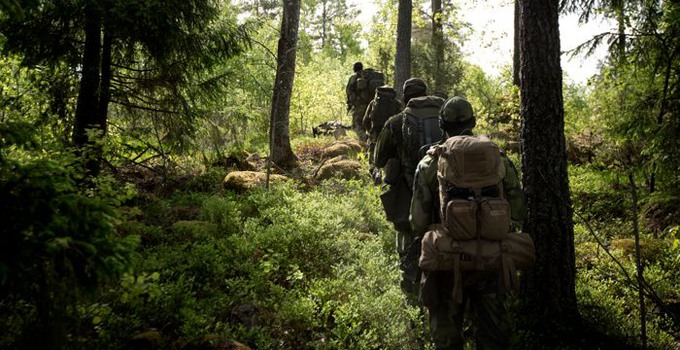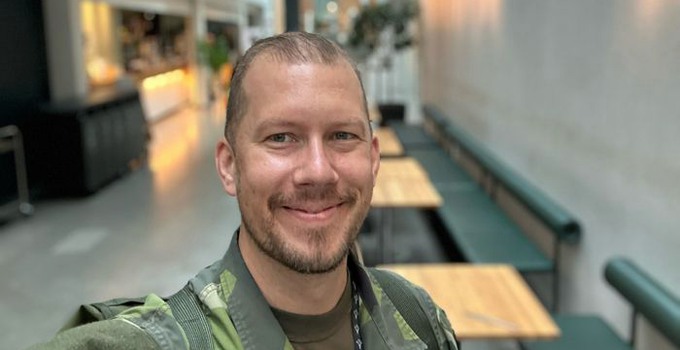
Foto: Emy Åklundh/Försvarsmakten.
How norms and values influence an organisation's flexibility
Organisational culture plays a crucial yet often overlooked role in how individuals and units respond to rapidly changing conditions. This is the conclusion of Mathias Wallin, who, in a new scientific article, examines cognitive flexibility by analysing two brigades in the Swedish Army.
Mathias Wallin, a lieutenant colonel and former student at the Joint Advanced Staff and Command Programme, recently published an article in the journal Defence Studies, where he explores how organisational culture impacts personnel’s ability to adapt to new situations. In his study, he compares the 4th and 19th brigades of the Swedish Army, two units of similar size, resources, missions, and goals.
"Organisational culture plays a vital but often underestimated role in how individuals and units respond to rapidly changing conditions. Adaptability and flexibility are essential in high-pressure situations, and I wanted to learn more about the cultural factors that enable or hinder this adaptability," he explains.

Mathias Wallin, lieutenant colonel and former student at the Joint Advanced Staff and Command Programme at The Swedish Defence University.
Culture shapes adaptability
The results reveal that organisational culture significantly influences personnel’s ability to adapt and adopt new perspectives.
"A competitive organisational culture can promote innovation, for example, but it may also be constrained by familiar exercise formats. Conversely, a culture that emphasises improvisation under tough conditions fosters flexibility, as it requires ingenuity and trust. However, it can also be inhibiting if associated with a fear of failure. Necessary demands for discipline must be balanced with openness to change," he says.
Research contributing to discussions on military leadership
The article is an extension of Mathias Wallin’s master’s thesis, written as part of the Joint Advanced Staff and Command Programme at the Swedish Defence University.
"The publication of this article in a scientific journal allows me to contribute to broader academic and professional discussions about military leadership and organisational culture. Sharing these findings with a wider audience is important to encourage debate, inspire future research, and provide practical benefits for the Swedish Armed Forces."
Wallin believes his study bridges theory and practice by examining how deeply rooted norms and values influence operational effectiveness—how well an organisation uses its resources to achieve goals and fulfil missions effectively and efficiently.
"It offers insights into how cognitive flexibility can be promoted by adapting leadership, organisational culture, and training methods," he explains.
For example, exercises with scenarios that are not predetermined can improve adaptability, while fostering a climate where questioning and innovation are encouraged can help avoid rigid hierarchies.
"Leadership that enables this type of culture can enhance mission command and improve operational effectiveness," he notes.
Combining military experience with research
Today, Mathias Wallin works in defence planning at the Swedish Army Staff, coordinating national defence planning with NATO’s plans and collaborating with neighbouring countries.
"I also serve as secretary for the Main Study Land, which supports the Swedish Armed Forces’ long-term perspective studies and the Army’s internal development. This work is greatly facilitated by the methodological training I received at the Swedish Defence University. Advanced officer education has deepened my understanding of the importance of critical thinking and adaptability and given me the confidence to navigate both academic and professional arenas. This is essential for handling complex issues and has shaped how I plan, lead, and make decisions."
He emphasises that research is a powerful tool for understanding and managing complex challenges.
"I see great value in combining military experience with continued academic research, particularly in areas such as tactics and leadership. Ongoing research is vital for a forward-leaning Armed Forces, driving innovation and improving efficiency in military organisations."
Interview with Mathias: Preparing Sweden's army for entry into NATO
Publication
Mathias Wallin (2024): Fighting to adapt: a study of the relationship between organizational culture and cognitive flexibility in Swedish army brigades, Defence Studies: Full article: Fighting to adapt: a study of the relationship between organizational culture and cognitive flexibility in Swedish army brigades
More about
War StudiesPage information
- By:
- Kommunikationsavdelningen
- Published:
- 2024-12-10
- Last updated:
- 2025-05-13
